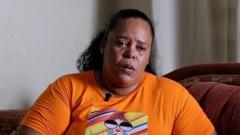Myrelis Casique López is adamant that her son, Francisco García, is innocent despite his deportation from the U.S.
**Mother Discovers Son in El Salvador Prison After U.S. Deportation**

**Mother Discovers Son in El Salvador Prison After U.S. Deportation**
A mother’s search for her deported son takes a shocking turn as she finds him in a notorious mega-jail.
In a heartbreaking revelation from Maracay, Venezuela, Myrelis Casique López was waiting for her son, 24-year-old Francisco José García, to return home after 18 months in the United States. When García broke the news of his imminent deportation to her, she felt a mix of hope and anxiety. However, her expectations quickly turned to despair when she spotted him on a TV report, not in Caracas, but at the Terrorism Confinement Centre in El Salvador, where over 200 Venezuelans were shown being detained by armed security forces.
The controversial U.S. deportations have been framed by the Trump administration as a crackdown on the Tren de Aragua, a criminal gang deemed a terrorist organization. Myrelis, however, fervently insists that her son is not a gang member but just a barber who left Venezuela seeking a better life amid rampant economic and political turmoil. "He doesn't belong to any criminal gang," she stated, highlighting the emotional toll the situation has taken on their family.
Despite U.S. immigration officials claiming that those deported were thoroughly vetted, many of the families are devastated, sharing stories of innocent family members being misidentified as gang affiliates solely based on their tattoos. Myrelis and other parents have identified their sons in the footage from the prison, raising alarm over the criteria used to determine gang membership.
The use of the Alien Enemies Act to facilitate these deportations has instilled fear among the Venezuelan community in the U.S. As Venezuelans witness the swift deportation of their loved ones without due process, a chilling effect permeates, causing anxiety about their own immigration statuses. Advocacy groups argue that the screenings are too lenient, and many families are now in limbo, uncertain of their futures.
Concerns are prevalent not only related to the deportations but also due to the end of the Temporary Protected Status for Venezuelans, affecting hundreds of thousands. This moment complicates the situation for many who fled violence and repression, bringing their uncertainty back to the surface as deportations continue.
The stories of Myrelis and others underscore the deep injustices and impacts of these policies, shedding light on the human aspect of immigration and deportation amidst a complex political landscape.





















